In order to actively implement the epidemic prevention and control work of the CPC Central Committee and sichuan Provincial Party Committee, the second Emei Forum on Public Management discussed and communicated with scholars all over the country on issues related to the modernization of national governance facing 2035 through cloud meetings. On December 12, 2020, the second E mei Forum on public management "modernizing National governancetoward2035" (Cloud Conference), sponsored by School of Public Affairs & Law of Southwest Jiaotong University, was successfully held. More than 400 experts and scholars in public management and young postgraduate and doctoral students from Qinghua University, Shanghai Jiaotong University, Zhejiang University, Nankai University, Nanjing University, Renmin University of China and other universities in China participated in this forum. This conference has received active attention and active participation from academic circles. The main report this morning shows that the online number of the conference room in Tencent has been more than 450 for a long time. Meanwhile, the online number of the live broadcast platform of The Political Scientist B station once reached more than 1500. There were 4 sub-forums in the afternoon, each of which had more than 100 participants per person.
The forum focused on the topic of "Modernizing National Governance toward 2035". Renowned experts, scholars and young talents from the field of public management were invited to have in-depth discussions on cutting-edge issues in the field of modernization of national governance.
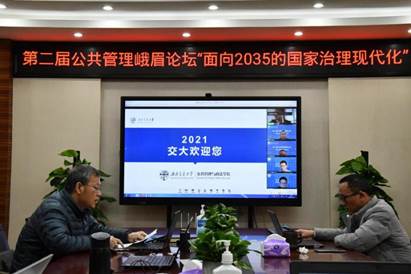
At 8:30am on December 12th, the forum was officially held. First of all, Wang Yongjie, dean of School of Public Affairs & Law of our university, delivered a speech, in which Wang warmly welcomed all the experts and scholars attending the conference. Then, taking the history of our university as the starting point, he briefly introduced the efforts and achievements made by our school in the discipline construction of public management in recent years, expressed his ardent hope and firm confidence in the next step of the development of our school's discipline of public management, and finally expressed his good wishes for the success of the forum.
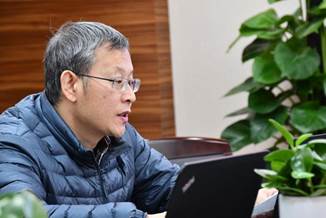
(Dean WangYongjiedeliveredopeningspeech)
Afterwards, the invited experts and scholars made keynote speeches on the theme of the forum. Professor Tong Xing of Nanjing University has expounded the three forms of government management and their legal basis. Professor Gao Xiaoping of The Chinese Society of Administration expressed his original views on the construction of China's emergency management system and mechanism with the title of "National Governance facing 2035: Overall Planning for Development and Security". Professor Han Zhiming from Shanghai Jiao Tong University published a paper entitled "What kind of stereotypes? What kind of maturity? The keynote speech of "The Vision of the Modernization of the National Governance System" deeply pondered the relevant theoretical issues of "The Governance of China". Professor Yu Wenxuan from Xiamen University discussed a series of meta-problems in epistemology and methodology of Chinese public management research with the title of "A New Approach to 2035: Ontology and Methodology of Chinese Public management Research". Professor Liu Peng of Renmin University of China discussed the mechanism of the process from "independent centralization" to "comprehensive decentralization" in the construction of government supervision system in China. Professor Wu Xiaolin of Nankai University, with the title of "Who says the imperial power is not the county -- on ancient community governance", discusses the related issues of ancient community governance from the historical dimension. Pang Mingli, professor of Zhongnan University of Economics and Law, made an in-depth analysis of the task decomposition mechanism of party and government bureaucracy in China with the title "Why the Anti-funnel Effect Arises: An Explanation of the Transfer mechanism of Public Governance tasks at different levels". Yan Changwu, a professor at Jinan University, titled "How do bureaucratic organizations handle irregular tasks?" A series of enlightening viewpoints are put forward. With the title of "Experience, Prospect and Path of Cross-regional Governance of China's Urban agglomerations", Professor Suo Liming of Nankai University carried out an in-depth analysis on relevant frontier hot issues of cross-regional governance of urban agglomerations.
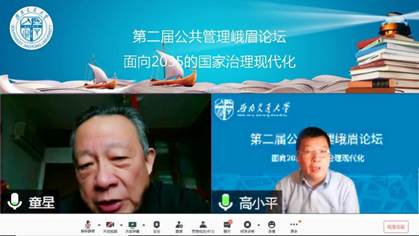
(Professor Tong Xing,Professor Gao Xiaopingreported)
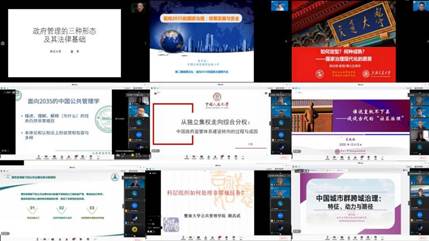
(pictures of reports)
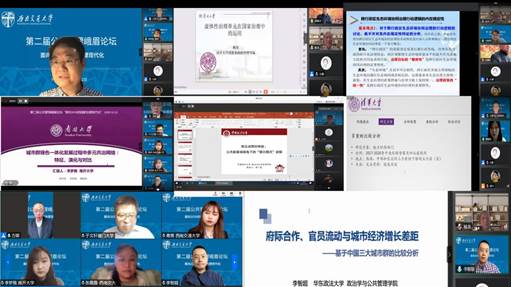
(pictures of conference)
From 14:00 PM to 17:30 PM, four parallel forums will be held simultaneously. Participants held specific discussions on four themes, namely, national governance modernization, urban and rural development and grassroots governance, local government and regional governance, and technology-oriented governance and reflection. At the end of the sub-forum, Lei Xuechuan, vice dean of the School of public management and Political Science and Law, gave an excellent overview of the views on various topics involved in the forum. In the end, President Wang Yongjie made a brief summary of the forum and also made a comprehensive introduction of the talent introduction policies of our institute. He also invited academic experts and scholars to guide the work of our institute and young talents to join us. At the same time, he also made a comprehensive introduction of the talent introduction policies of our institute and invited more academic experts and scholars to guide the work and young talents to join us.
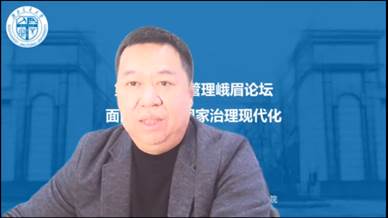
(Lei Xuchuan, Vice President,made asummary)
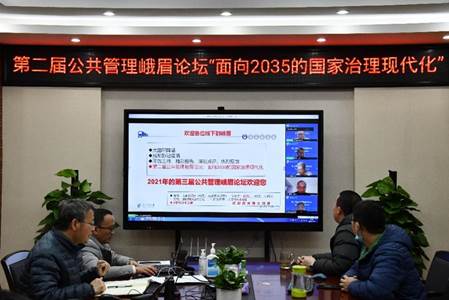
(Dean WangYongjiedeliveredendingspeech)
The forum has ended, wonderful not to end. The new era of major-country governance is inseparable from the modernization of national governance. It also calls for more explanatory and guiding Chinese social sciences based on China's local experience, international vision and the concern of The Times. Looking forward to the next 15 years, in the new era of national governance modernization and information revolution, how the discipline of public management will develop, and what knowledge system and governance wisdom the academic community of public management can contribute to the modernization of national governance should reflect the responsibilities and responsibilities of scholars in the discipline of public management in the new era. In the new era, we will focus on new goals and embark on a new journey for a new future. Let's get together again at the third Emei Forum on Public Management in 2021!



